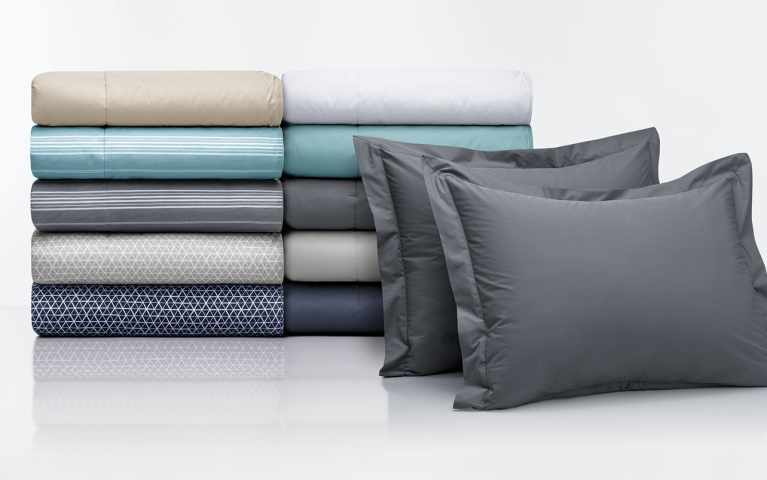
Keep your sheets and pjs clean for great, healthy sleep.
Does anyone really like doing laundry?
It's considerable work to strip the sheets, fill the washing machine, and then make all the beds all over again. How often should this chore be done?
According to experts sources, while it can be tempting to let the sheet laundry linger, it's a good idea to put your bedding on a regular, fairly frequent wash schedule.
As you sleep, you slough off tons of dead skin cells — enough to feed 1 million dust mites every night, according to the Cleveland Clinic. This makes your sleep space a great breeding ground for bacteria, which can plug your hair follicles, contribute to acne, and lead to skin irritation in some cases.
The Magic Number
Washing your sheets twice a month is a pretty good rule of thumb according to the Good Housekeeping Institute, but here are some factors the Huffington Post cites as reasons you might want to wash more often:
-
It's summertime and you're sweating more
-
You sleep sans pajamas
-
You go to bed without showering (particularly if you worked out beforehand)
-
You're sick
-
You ate in bed and spilled on the sheets
For the 20 million Americans who are allergic to dust mites — this might be you if you find yourself feeling like you have a cold that never goes away — weekly washings are a good idea.
If you suffer from allergies, a water temperature of 130 degrees Fahrenheit (the hot-water setting on most washers) or hotter will be the most effective, says the Asthma and Allergy Foundation of America. Just be careful not to shrink the sheets by going too hot with the water.
Clean your sheets at the highest temperature indicated on the care tag, and don't overstuff the washing machine — sheets need a little room to breathe to get clean. If you really want to get fancy, a hot iron afterward can further help to kill germs, and will give you that freshly-pressed feeling.
Bedding Beyond Sheets
If you're the responsible type who always makes your bed right after you wake, relax and give your sheets a chance to air out a little every morning before covering them tightly with your comforter or duvet. This will allow moisture that might be lingering to evaporate.
Fun fact: Data shows making your bed may improve your sleep quality. 73% of Sleep Number® smart sleepers make their bed every day. Compared to those who don't make their bed, this group wakes up 20 minutes earlier but are MORE restful and end up getting four more minutes of restful sleep.** Four minutes multiplied by all the nights could give you much more quality shuteye.
Fortunately, blankets don't need to be washed nearly as often if they're just sitting at the end of your bed and not coming into contact with your skin. If you do have a comforter directly on you, wash the comforter cover as often as your sheets. Pillowcases should also be on a frequent cleaning rotation; turning them inside out can help preserve the color.
Bonus: Drying pillows will help keep them nicely fluffed. (Wondering if it's time to replace your pillow? Find out here.)
Washing your bedding may be a chore, but it's tough to beat the feeling that comes from slipping in between a pair of clean sheets. The resulting sweet, healthy slumber is worth any hassle.
Washing Your Pajamas
You've probably got a good laundry routine down by now.
You wash socks and gym shirts after one workout, let bras and loose shorts go a few wears between washings, and stretch jeans a little longer before hitting the suds.
But what to do about pajamas? They tend to slip our minds, even though they're worn nightly. And unlike most other garments, not everyone agrees on how long the optimal wear-to-wash cycle is.
The Importance of Washing
Altogether, the general consensus for washing pajamas is somewhere between a day and a week. What's the reason for the frequency? As you snooze, your skin rubs against your sleepwear, transferring dead skin cells to the fabric.
Even if your pajamas still smell somewhat fresh, this invisible buildup of bacteria can contribute to conditions like body acne and infected cuts. You also might wake up feeling a little grimy; never a good start to the day.
When deciding a wash schedule for you and other members of your household, consider these personal factors:
-
How much you sweat when you sleep — more sweat requires more-frequent washing
-
Whether you take a shower at night, before putting on your PJs — this keeps them cleaner
-
What materials your nightwear is made from — wool, for example, resists moisture, so it can be worn a little longer before laundry time
Wash the Right Way
When washing pajamas, be sure to read the label for best practices. Flannel should be turned inside out, while silk is usually best cleaned by hand. You'll want to wash your pajamas at the highest temperature they can tolerate without risking shrinkage or stretching.
Don't go too long between washes. Knowing you're wearing clean pajamas might even help you sleep better.
Like diet and exercise, quality sleep is essential for optimal wellbeing and performance. Because everyone's sleep needs are different, Sleep Number® smart beds sense your movements and automatically adjust firmness, comfort and support to keep you both sleeping comfortably. Find your Sleep Number® setting for your best possible night's sleep.